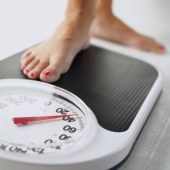- 8 Ways to Increase Dopamine Naturally
- 7 Best Breads for Maintaining Stable Blood Sugar
- Gelatin vs. Collagen: Which is Best for Skin, Nails, and Joints?
- The Long-Term Effects of Daily Turmeric Supplements on Liver Health
- Could Your Grocery Store Meat Be Causing Recurring UTIs?
- Are You Making This Expensive Thermostat Error This Winter?
- Recognizing the Signs of Hypothyroidism
- 10 Strategies to Overcome Insomnia
- Could Artificial Sweeteners Be Aging the Brain Faster?
- Techniques for Soothing Your Nervous System
Childhood Stress May Spur Weight Gain in Women


Childhood stress appears to play a significant role in some women’s weight gain, a new study suggests.
Stress during adulthood does not affect women’s weight gain, the researchers found. And neither childhood nor adult stress is associated with weight gain in men.
Childhood may be a critical time for establishing patterns that affect women’s weight over time, said study author Hui Liu, an associate professor of sociology at Michigan State University.
Researchers analyzed data from more than 2,200 women and 1,300 men who were interviewed four times over 15 years as part of a national survey called Americans’ Changing Lives.
Childhood stress included family-related issues that occurred up to age 16. They included economic hardship, divorce, having at least one parent with a mental health problem, and never knowing one’s father. Adult stress included factors such as job loss, death of a spouse/partner, and challenges associated with parenting and care providing.
Women with higher levels of childhood stress gained weight more rapidly than those with less childhood stress, the study found.
However, the study only found a link between childhood stress and later weight gain, not a direct cause-and-effect relationship.
Gender differences in response to stress may explain why neither childhood nor adult stress affected men’s weight. Women may eat more to cope with stress, while men are more likely to drink alcohol or become withdrawn, Liu said.
Also, women are more likely to suffer from depression than men, and depression is associated with emotion-driven eating and weight gain, she said.
The study appears online in the August issue of the journal Social Science & Medicine.
“These findings add to our understanding of how childhood stress is a more important driver of long-term weight gain than adult stress, and how such processes differ for men and women,” Liu said in a university news release.
The findings show the need to find ways to reduce childhood stress.
“Given the importance of body mass on health and disability, it’s important that we consider the sex-specific social contexts of early childhood in order to design effective clinical programs that prevent or treat obesity later in life,” Liu said.
More information
The U.S. Centers for Disease Control and Prevention has more about weight.
Source: HealthDay
Copyright © 2026 HealthDay. All rights reserved.










